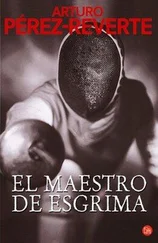Arturo Pérez-Reverte - Purity of Blood
Здесь есть возможность читать онлайн «Arturo Pérez-Reverte - Purity of Blood» весь текст электронной книги совершенно бесплатно (целиком полную версию без сокращений). В некоторых случаях можно слушать аудио, скачать через торрент в формате fb2 и присутствует краткое содержание. Жанр: Старинная литература, на английском языке. Описание произведения, (предисловие) а так же отзывы посетителей доступны на портале библиотеки ЛибКат.
- Название:Purity of Blood
- Автор:
- Жанр:
- Год:неизвестен
- ISBN:нет данных
- Рейтинг книги:3 / 5. Голосов: 1
-
Избранное:Добавить в избранное
- Отзывы:
-
Ваша оценка:
- 60
- 1
- 2
- 3
- 4
- 5
Purity of Blood: краткое содержание, описание и аннотация
Предлагаем к чтению аннотацию, описание, краткое содержание или предисловие (зависит от того, что написал сам автор книги «Purity of Blood»). Если вы не нашли необходимую информацию о книге — напишите в комментариях, мы постараемся отыскать её.
Purity of Blood — читать онлайн бесплатно полную книгу (весь текст) целиком
Ниже представлен текст книги, разбитый по страницам. Система сохранения места последней прочитанной страницы, позволяет с удобством читать онлайн бесплатно книгу «Purity of Blood», без необходимости каждый раз заново искать на чём Вы остановились. Поставьте закладку, и сможете в любой момент перейти на страницу, на которой закончили чтение.
Интервал:
Закладка:
Dejected, the poet took a swallow, and then another. His eyes had begun to water.
“But to turn a convent upside down,” he said, underscoring the obvious, “is not a trifling matter.”
“Nor is taking La Goleta, pardiez! ” The captain strode to the table, where he picked up his pistol and removed the primer and charge. “They tell that my mother’s great-uncle, a man well known in the day of Charles the Fifth, broke into a convent one day in Seville.”
Don Francisco looked up, interested. “Was he one who inspired Tirso’s play?”
“So they say.”
“I was not aware that you were related.”
“Well, now you know it. Spain is a pocket handkerchief: here everyone knows everyone, and all roads cross.”
Quevedo’s eyeglasses were dangling from their cord. Thoughtful, he held them a moment but did not place them on his nose. Instead, they dropped from his fingers to again hang above the embroidered cross on his chest, and he reached instead for the wine. He drank a long, last draught, gazing lugubriously at the captain over the lip of the jug.
“Well, by the good Christ, I venture that your uncle, that trickster Don Juan, had a bad third act.”
III. MADRID STEEL
The next morning found me at mass with Diego Alatriste and Señor de Quevedo, a rather momentous event. Don Francisco, both because of his Santander heritage and his cross of Santiago, felt it a point of honor to fulfill the rituals of the Church, but the captain was not moved a hair by a Dominus or a vobiscum. It is, however, only fair to point out that for all his oaths, moderate in themselves, for all the blasphemy and By Gods, only standard in his former profession, never in all the years I spent at his side did I hear Alatriste speak a word against religion. Not even when, in the Tavern of the Turk, his friends’ controversial comments left Dómine Pérez in the middle and no maxim with a breath of life. Alatriste did not practice Catholicism but he respected tonsures, robes, and wimples in the same way that he respected the authority and the person of ourlord and king. Perhaps it was his discipline as a soldier, or it may have been the stoic indifference that seemed to govern his moods and his character. A further detail: though he so seldom attended mass himself, the captain always obliged me to pay my dues to God every Sunday and feast day, whether in the company of Caridad la Lebrijana—like all former whores, La Lebrijana was extremely pious—or Dómine Pérez. And two days a week, at Alatriste’s insistence, the good priest taught me grammar, a little Latin, and enough catechism and Sacred History that, as the captain said, no one would take me for a Turk or an accursed heretic.
He was a man of many contradictions. Not much later, in Flanders, I had occasion to see him kneeling with bowed head as the tercios were preparing for combat and the chaplains were going up and down the rows blessing all the men. He did not do it to affect piety but, rather, to show respect for comrades who were going off to die believing in the efficacy of the whole rigmarole. Alatriste’s God was neither placated by laud nor offended by oaths; He was a powerful and dispassionate being who did not manipulate the puppets on the stage of life, but merely observed them. And it was also He who, with reasons incomprehensible to the actors in the human comedy—why not just call it a farce—operated the stage machinery, causing lethal trapdoors to open or revolving panels to shift suddenly, sometimes imprisoning you in shackles and other times—a literal deus ex machina —extracting you from the most dire situations. It might all be due to that long-ago prime motion and efficient cause that Dómine Pérez mentioned one fine afternoon when he had been a bit too free with the sweet wine and was attempting to explain Saint Thomas’s five proofs to us. But as for the captain, his interpretation of the matter was possibly closer to what the Romans—if I am not deceived by the Latin I learned from that same dómine —called fatum.
I remember a taciturn Alatriste, when enemy artillery was creating significant lacunae in our ranks, and all around, fellow soldiers were making the sign of the cross, commending themselves to Christ and the most blessed Virgin. Suddenly you heard them reciting prayers they had learned as children, and the captain murmuring “Amen” along with them, so they would not feel alone when they fell to the ground and died. His cold, gray-green eyes nevertheless were fixed on the undulating rows of the enemy cavalry, on the musket fire issuing from the terreplein of a dike, on the smoking bombs that snaked across the ground before exploding in a burst that left the Devil well supplied. It was evident that “Amen” did not bind him in any way, as one could read in the absorbed gaze of an old soldier attentive only to the monotonous drumroll from the center of the tercio, a beat as slow and calm as the tranquil pace of the Spanish infantry and the serene beating of his heart. Because Captain Alatriste served God as he served his king. He had no reason to love God, even to admire Him, but being who he was, he afforded the deity his respect.
One day when we had taken a bellyful of steel and shot on the banks of the Merck River, near Breda, I saw Alatriste do battle for a flag and the corpse of our field marshal. And I know that although he was willing to sacrifice his hide—and for good measure mine—for that dead body sieved by musket balls, he did not give a fig for either don Pedro de la Daga or the flag. That was what was puzzling about the captain: he could show respect for a God who did not matter to him, fight for a cause in which he did not believe, get drunk with an enemy, or die for an officer or a king he scorned.
Yes, we went to mass, although the motive was far from pious. The church, as Your Mercies will undoubtedly have suspected, was the one attached to the convent of La Adoración. Las Benitas was near the palace and almost straight across from the convent of La Encarnación, which was next to the small plaza of the same name. Las Benitas’s eight-o’clock mass was in vogue, for that was where Teresa de Guzmán, the wife of the Conde de Olivares, came to worship. Furthermore, the chaplain, don Juan Coroado, had a reputation for cutting a fine figure before the altar and preaching a fine homily from the pulpit. So the church was frequented not only by truly religious women but also by ladies of good breeding, drawn there by the Condesa de Olivares or by the chaplain, and by other women who had no breeding at all, but pretended to. Even harlots and flamboyant actresses—as pious in matters of dogma as the next—dropped in with the required devotion, thickly powdered and rouged beneath the folds of their mantillas and fine black silks, and dripping with laces from Lorraine and Provence—those from Flanders being reserved for ladies of greater substance. And since the presence of so many ladies, genteel or otherwise, drew more males than lice to a muleteer’s doublet, the famed eight-o’clock mass filled the small church from altar to atrium. Some female worshipers had eyes only for God, while others sent volleys of Cupid’s darts flying above their fans. Gallants lurked behind columns or beside the font to offer the ladies holy water; beggars sat on the steps outside the door, exhibiting their sores and pustules and the mutilations supposedly earned in Flanders, even Lepanto, and wrangling over the best places at the exit from the mass, ready to berate arrogantly, as their right, the caballeros and damas who gave themselves airs but would not allow a wretched copper coin to see the light of day.
The three of us positioned ourselves near the door, at a spot from which we could survey both the nave of the church and the choir, and the iron lattice that divided the church from the convent. At that moment, the nave was so jammed with people that had there been only one or two more, the Christ on the main altar would have had to be portrayed hanged, arms at his side, rather than crucified. I watched the captain, hat in hand and cape over his arm, study the plan of the building, just as, when we reached the church, his alert eyes had registered every detail of the garden walls and the façade of the convent. The mass had progressed to the liturgy of the word, and when the celebrant turned to the assembly I was at last able to see the face of the renowned chaplain Coroado, who was reeling off Latin with eloquence, finesse, and aplomb. He seemed to be well favored, elegant beneath the chasuble, thick black hair tonsured and trimmed at the nape of his neck. His eyes were dark and penetrating, and it was not difficult to imagine their effect upon the daughters of Eve, especially in the case of nuns whose order closed off all contact with the world and the opposite sex.
Читать дальшеИнтервал:
Закладка:
Похожие книги на «Purity of Blood»
Представляем Вашему вниманию похожие книги на «Purity of Blood» списком для выбора. Мы отобрали схожую по названию и смыслу литературу в надежде предоставить читателям больше вариантов отыскать новые, интересные, ещё непрочитанные произведения.
Обсуждение, отзывы о книге «Purity of Blood» и просто собственные мнения читателей. Оставьте ваши комментарии, напишите, что Вы думаете о произведении, его смысле или главных героях. Укажите что конкретно понравилось, а что нет, и почему Вы так считаете.











